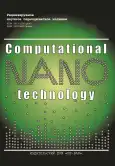Math Methods and Models of Products Knowledge Management
- Authors: Trishin A.A.1
-
Affiliations:
- Financial University under the Government of the Russian Federation
- Issue: Vol 9, No 4 (2022)
- Pages: 35-41
- Section: Articles
- URL: https://journal-vniispk.ru/2313-223X/article/view/147161
- DOI: https://doi.org/10.33693/2313-223X-2022-9-4-35-41
- ID: 147161
Cite item
Abstract
Full Text
##article.viewOnOriginalSite##About the authors
Alexey A. Trishin
Financial University under the Government of the Russian Federation
Email: info@nationalscience.ru
graduate student Moscow, Russian Federation
References
- O’Grady M. Half of online retail spending came from marketplaces in 2016. Research article. URL: https://www.forrester.com/blogs/half-of-online-retail-spending-came-from-marketplaces-in-2016/(data of accesses: 15.01.2021).
- Maksimov N., Lebedev A. Knowledge ontology system. In: Procedia Computer Science: Annual International Conference on Brain-Inspired Cognitive Architectures for Artificial Intelligence: Eleventh Annual Meeting of the BICA Society. 2020. No. 190. Pp. 540-545.
- Haav H. A semi-automatic method to ontology design by using FCA. In: Proceedings of Concept Lattices and their Applications (CLA). V. Snásel, R. Belohlávek (eds.). Ostrava, Czech Republic, 2004. Pp. 13-24.
- Avdeenko T.V., Makarova E.S. Knowledge representation model based on case-based reasoning and the domain ontology: Application to the IT consultation. IFAC-Papers Online, 2018. Vol. 51. Issue 11. Pp. 1218-1223.
- Grimm S., Hitzler P. Knowledge representation and ontologies. Semantic Web Services: Concepts, Technologies, and Applications. 2007. Pp. 51-106.
- Sheth A., Ramakrishnan C., Thomas C. Semantics for the Semantic Web: The implicit, the formal and the powerful.International Journal on Semantic Web and Information Systems. 2005. No. 1 (1). Pp. 1-18.
- Guha R., McCool R., Miller E. Semantic search. In: The Twelfth International World Wide Web Conference, May 2003.
- Broekstra J., Kampman A., van Harmelen F. Sesame: A generic architecture for storing and querying RDF and RDF Schema. In: Proceedings of the First Internation Semantic Web Conference, number 2342 in Lecture Notes in Computer Science. I. Horrocks, J. Hendler (eds.). Springer Verlag, July 2002. Pp. 54-68.
- Kifer M.Rules and Ontologies in F-logic. Department of Computer Science. Stony Brook University, 2005.
- Haase P., Broekstra J., Eberhart A., Volz R. A comparison of RDF query languages. In: The Semantic Web - ISWC 2004. Proceedings of the Third International Semantic Web Conference, 2004.
- Sheth A., Ramakrishnan C. Semantic (Web) technology in action: Ontology driven information systems for search, integration and analysis. IEEE Data engineering Bulletin, Special issue on Making the Semantic Web Real. December 2003. Pp. 40-48.
- Corcho O., Gómez-Pérez A. Solving integration problems of e-commerce standards and initiatives through ontological mappings.International Journal of Intelligent Systems. 2001. No. 16.
- Fensel D., McGuinness D.L., Schulten E. et al. Ontologies and electronic commerce. IEEE Intelligent Systems. 2001. No. 16 (1). Pp. 8-14.
- Obrst L., Wray R.E., Liu H. Ontological engineering for B2B e-commerce. In: Proceedings of the International Conference on Formal Ontology in Information Systems (FOIS 2001). ACM Press, 2001. Pp. 117-126.
- Hepp M., Leukel J., Schmitz V. A quantitative analysis of eClass, UNSPSC, eOTD, and RNTD: Content, coverage, and maintenance. In: Proceedings of the IEEE International Conference on e-Business Engineering (ICEBE 2005). IEEE Computer Society, 2005. Pp. 572-581.
- Hepp M. Goodrelations: An ontology for describing products and services offers on the web. In: Proceedings of the 16th International Conference, Knowledge Engineering and Knowledge Management Conference (EKAW 2008), LNCS, Vol. 5268, Springer, 2008, pp. 329-346
- Cuadrado A.F., de la Torre E.V. SIS: Semantic Intelligent Search engine from heterogeneous information sources applied to e-commerce. GI Jahrestagung. 2008. No. 2. Pp. 700-705.
- Schuster D., Walther M., Braun I. Towards federated consumer product search from heterogeneous sources. In: Proceedings of IADIS International Conference WWW/Internet. 2008. Pp. 453-456.
- Walther M., Schuster D., Schill A. Federated product search with information enrichment using heterogeneous sources. In: Proceedings of the 12th International Conference on Business Information Systems (BIS 2009). Lecture Notes in Business Information Processing. Vol. 21. Springer, 2009. Pp. 73-84.
- Zhang L., Huang W. A framework for an ontology-based e-commerce product information retrieval system. Journal of Computers. Academy Publisher. 2009. No. 4 (6). Pp. 439-440.
- Oyelade O., Junaidu S., Obiniyi A. Semantic web framework for e-commerce based on OWL. IJCSI International Journal of Computer Science. 2014. Vol. 11. Issue 3. No. 2. Pp. 1694-0814. URL: 1694-0784.www.IJCSI.org
- Mao M., Chen S., Zhang F. et al. Hybrid ecommerce recommendation model incorporating product taxonomy and folksonomy. Knowledge-Based Systems. 2021. Vol. 214.
- Kejriwal M., Shen K., Ni Ch.-Ch., Torzec N. An evaluation and annotation methodology for product category matching in e-commerce.Computers in Industry. 2021. Vol. 131.
Supplementary files








